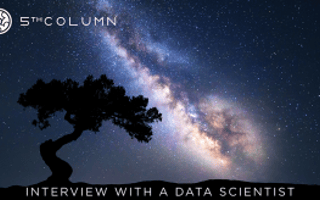We often get asked one specific question here at 5thColumn: what does a data scientist do? Instead of us trying to answer that for them, we thought it would be best to have one of them answer it themselves. Meet Jason Carlock.
What’s your title and how long have you been with 5thColumn?
I’m a data scientist and I’ve been with 5thColumn for one year.
What does a Data Scientist do exactly?
Data scientists unlock insights hidden in data. We explain data, group it together, and make future predictions by analyzing and learning structure embedded in past data. As a consequence, data scientists work with a variety of tools from the worlds of statistics, computer science, and data visualization.
How did you get into it?
I have always been both creative and technical, and data science is a good way to leverage both strengths. A few years ago I decided to pursue a masters degree in data science. Near the end I completed my capstone project and I took on a contract at a green energy company while working as an adjunct professor teaching machine learning. Then I took a position at 5thColumn.
What role does data play in cybersecurity, specifically at 5thColumn?
Data science at 5thColumn is a significant amount of our internal research and development. The analysis of data allows us to gain insight into our client’s networks and develop strategies for remediation. In this context we are able to use data to develop awareness on what is going on in our client’s network, but also in the development of AI-type solutions. Data science is critical to our organizational growth and development of new products and services.
What should every data scientist know about machine learning?
Every data scientist should have a good overview of the field of machine learning. This includes a basic understanding of the models that are fit to data, such as deep learning models, mixture models, and ensemble models. Additionally, an understanding of how these models are optimized to produce their best estimates is essential. Lastly, every data scientist should know how to validate our systems to ensure they perform well in the real world.
Is it better for a person to stay in school and enroll in a graduate program, or is it better to acquire the skills on-the-job?
It depends on the person. Some people with strong technical backgrounds may be able to learn on-the-job. However, the field of data science is vast, and it helps to have the foundation of a graduate program.
Do you see advances in analytic packages replacing the need for some of the skills that data scientists have traditionally had, such as programming skills (Python, Java, etc.)?
Right now nothing will replace having solid programming skills. Python is commonly used in industry right now, although knowledge of other languages such as Java or C++ are also useful.
What is the number one piece of advice you give to aspiring data scientists?
Work on example datasets and immerse yourself in the field. There is no better way to get a job as a data scientist than to show that you are useful and contribute positively to an organization.








